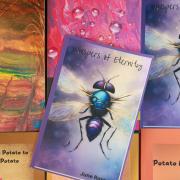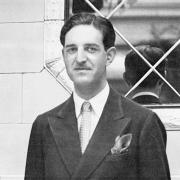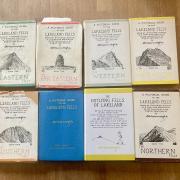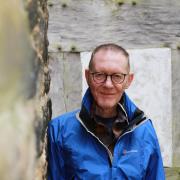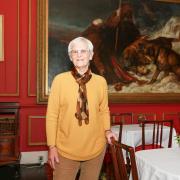An ex-police officer has become the first female vice-chancellor of one of our universities. Mike Glover reports.

LITTLE did Julie Mennell know when she was pounding the streets of Lancaster as a bobby on the beat that she would return to the city one day as the boss of a university. But then Professor Mennell says she doesn’t make long term career plans. Instead she admits she is driven by a compulsion to seek improvements wherever she works.
‘I am always striving to improve. I have been very fortunate but I have never had a career game plan. I just want to be the best that I can,’ she says. ‘When the results flow for the institution, then personal success sometimes comes with it.’
She puts the attitude down to her successful teenage years as an athlete, being northern 400-metre champion, always wanting to beat her personal best.
Injury put paid to the professional sports career. But it did nothing to undermine this motivation to succeed and Prof Mennell, a mother of three teenage children, was recently inaugurated as vice-chancellor of the University of Cumbria.

Born and bred in Middlesbrough, Prof Mennell gained a degree in physics and mathematics at Leeds University before joining the police force.
Her first interview was in Lancaster and she got the job, just weeks before she was due to marry. She and husband, John, moved to Lancaster where she spent time on the beat as part of her induction.
‘Being in the police was a tremendous experience and helped me develop all sorts of life skills, such as dealing with people in challenging circumstances and understanding how different parts of the community interact with each other,’ she says.
Being in the police in the early 1990s was a good career with lots of opportunities, but she wanted to do a PhD before it was too late.
So it was back to Teesside to study applied physics, specialising in a study of measuring pulverised fuel flow in pipes using X-ray attenuation. Having acquired the PhD she became a lecturer in measurement science, teaching physics, maths and engineering.
By coincidence – there’s that lack of career planning again – she was able to utilise her skills to developing forensic measurement science, partly to attract more women into physics and the sciences.
She developed new university programmes focused on applying science and technology at crime scenes, and became the director of the centre of forensic investigation, based at Teesside where she developed an international reputation.
By 2006 she was Dean of the School of applied sciences at Northumbria University, which in turn led her by 2010 to be deputy vice-chancellor at the University of Sunderland.
The University of Cumbria was founded in 2007 from the union of Cumbria Institute of the Arts in Carlisle, St Martin’s College, Lancaster, which also included the old Charlotte Mason College in Ambleside, and University of Central Lancashire Cumbrian sites. The university now has campuses in Carlisle, Lancaster, Ambleside and London.
Its first Vice-Chancellor was Professor Chris Carr, who had been running St Martin’s College in Lancaster. The University’s Chancellor, then and now, is Archbishop of York, Dr John Sentamu, largely a ceremonial role, although he did chair the panel which appointed Professor Mennell.
Prof Mennell has offices in Lancaster, in the old officers’ mess of the Kings Own Royal Regiment Bowerham barracks, and in Carlisle. The 70-mile trip between the two demonstrates the scale of the challenge facing her.
The university has had its teething problems. In 2010, it was £13 million in deficit and had to be bailed out by the Government for the staff to be paid.
Prof Mennell says it is in a much better financial state now and is generating year on year surpluses which are being reinvested in student facilities, although she is understandably coy about the details.
It originally aimed for 15,000 students, with a stated hope to grow to 20,000, but presently has just over 10,000, approximately a third of them in Lancaster. So there is room for student growth.
And Prof Mennell is confident for the future. She points out that 97% of students have a job, or go on to further education, six months after graduating. In this respect it is the second most successful university in the country.
Prof Mennell says: ‘That is a really strong endorsement of the value and impact of the university on providing opportunities for our students.’
Since taking up the reins in August she is focussing on how the university can play a bigger role to meet the region’s social and economic agenda and skill needs. With major developments like the new nuclear power station at Moorside, expansion by Glaxo Smith and Klein at Ulverston and BAE at Barrow, with the developing nuclear submarine programme, it is clear that thousands of highly skilled engineers are needed. To that end she is tuning in to the Government’s apprenticeship schemes.
Equally she sees a vastly expanded need for health workers, education, other social sciences and the arts and creative sector to serve the growing population and communities. The Lancaster campus also specialises in paramedic training and sports sciences.
‘University of Cumbria needs to be able to provide a solution for the education needs of Cumbria people, but we need to do more than that.
‘We need to help attract new talent into the county, to work, live and contribute to the economy and for the benefit of our communities,’ says Prof Mennell.
Two of her children are off to university themselves this autumn. Her eldest son is following in mum’s footsteps going to Leeds, studying geological science and her daughter, is heading to London to study fashion promotion and marketing.
Their plans were fixed before mum got her new job. However her youngest son can expect to be confronted with University of Cumbria’s prospectus in a couple of years’ time.
She may not make long term career plans, but striving to make University of Cumbria a growing success looks like her beat for some years to come.








